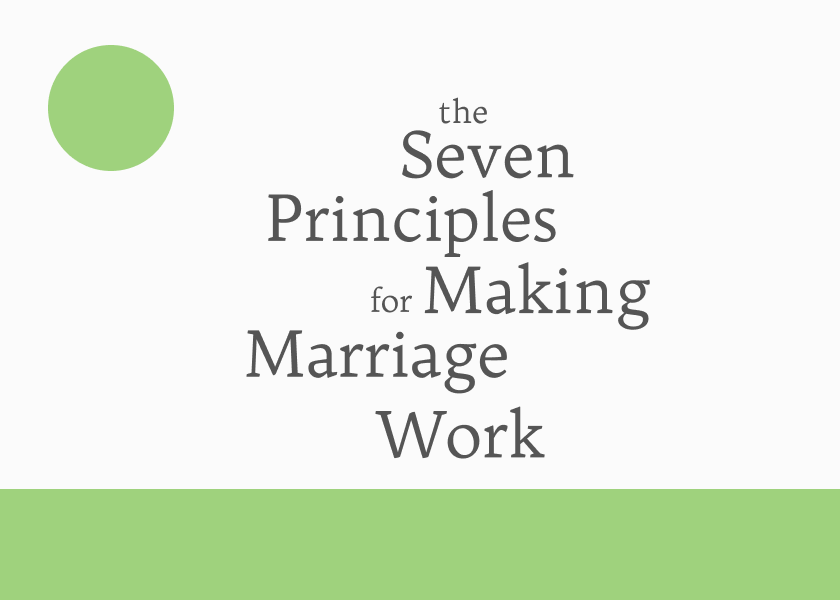The Seven Principles for Making Marriage Work by John Gottman - Summary
Discover the secrets to a lasting, loving marriage! This book, based on years of research, reveals seven principles that can transform your relationship. Learn to enhance your love map, nurture fondness, turn towards each other, let your partner influence you, and more.

The following is a summary of the book The Seven Principles for Making Marriage Work by John Gottman.
Listen to ShelfHelp's podcast summarising The Seven Principles for Making Marriage Work.
Is Your Marriage Drifting? Discover the Seven Principles to a Lasting Partnership
Are you tired of endless arguments and feeling disconnected from your spouse? Do you wonder why some marriages thrive while others fail? In The Seven Principles for Making Marriage Work, Dr. John Gottman, a renowned relationship expert, offers a research-backed guide to creating a happy and enduring marriage. This article provides a detailed summary of his work, giving you the key insights to transform your relationship. You don't have to spend countless hours reading the entire book, because this article highlights the core concepts, saving you valuable time whilst offering actionable tips to improve your marriage today.
Table of Contents
- About the Author
- Who Should Read This Book?
- Key Insights and Themes
- Detailed Summary
- Review
- Actionable Takeaways
- FAQs
- Conclusion
About the Author
Dr. John Gottman is a distinguished relationship researcher and therapist. His work is founded on decades of scientific study, including the famous "Love Lab" where he observed couples' interactions. Gottman's research, supported by the National Institute of Mental Health, has allowed him to predict divorce with remarkable accuracy. He is not just theorising, his approach is based on data, making his advice more reliable than opinion-based guidance. His collaboration with his wife, clinical psychologist Julie Gottman, has further refined his therapeutic approach for couples. Dr. Gottman's work is highly regarded within the marital therapy field with references to other influential figures, such as Les Greenberg and Susan Johnson. He is also indebted to other important contributors to the field of marital therapy, including Neil Jacobson and Clan Wile.
Who Should Read This Book?
This book is for anyone in a committed relationship, regardless of whether they are facing immediate crises or simply want to strengthen their bond. Specifically, it is valuable for:
- Couples experiencing frequent conflicts: If you find yourselves constantly arguing, this book can provide tools to resolve these issues constructively.
- Partners feeling disconnected: If you feel like you've grown apart or live separate lives, the book offers ways to rekindle your connection and friendship.
- Newlyweds: Starting off with a solid understanding of relationship dynamics can set the foundation for a happy, lasting marriage.
- Long-term couples: Even if you’ve been together for many years, you can still benefit from the book’s insights and exercises to enhance your intimacy.
- Those considering marriage or remarriage: This book gives a practical guide on what makes a relationship work and helps individuals make informed decisions.
- Therapists, counselors, and mental health professionals: The approach is based on rigorous, scientific data and so offers practical advice that is unlike much of the traditional marriage guidance.
Key Insights and Themes
Here are the main ideas, or key takeaways, from The Seven Principles for Making Marriage Work:
- Friendship is the Foundation: A strong marital friendship, marked by mutual respect and enjoyment of each other’s company, is crucial.
- Love Maps: Knowing your partner's inner world, including their likes, dislikes, dreams, and worries is essential. This detailed knowledge is referred to as a "love map".
- Turning Towards: Responding to your partner's bids for connection, instead of ignoring or turning away, is key to building emotional intimacy.
- Accepting Influence: Sharing power and decision-making with your partner is vital for a stable and happy marriage.
- Solving Solvable Problems: Learning to distinguish between resolvable and perpetual issues and how to approach them differently is a key theme of the book.
- Overcoming Gridlock: Understanding and honouring your partner's dreams, even when they differ from your own, is essential for navigating conflict.
- Creating Shared Meaning: Building a life together that is rich with symbols, rituals, and mutual goals will deepen your bond.
- Emotional Intelligence: Successful couples have mastered a way to balance the negative with the positive and are described by Gottman as "emotionally intelligent".
Detailed Summary
The book is structured around seven core principles, each designed to enhance and strengthen your marriage. Here is a detailed breakdown of these ideas:
Principle 1: Enhance Your Love Maps
A “love map” is the part of your brain where you store all the relevant information about your partner's life. Couples who have strong love maps are deeply familiar with each other’s worlds.
- Practical Steps: Take time to learn more about your partner's inner world. Use questionnaires and exercises to discover their friends, stresses, dreams, and philosophies.
- Ongoing process: Regularly update your knowledge of your partner as their life evolves.
- Examples: Knowing your partner's favourite music, their relatives they like the least, and their current stresses are all examples of love map knowledge.
Principle 2: Nurture Your Fondness and Admiration
This principle is about cherishing your partner and expressing your positive feelings, even when you are facing difficulties.
- Practical Steps: Practice appreciation by identifying and focusing on the positive qualities you admire in your spouse. Make an effort to express your affection physically and verbally.
- Ongoing process: Reflect on the history of your relationship by looking at old pictures or talking about key moments.
- Examples: Giving your partner the drumsticks because you know they love them or going to church with your spouse even if you aren't religious.
Principle 3: Turn Toward Each Other Instead of Away
This is about responding positively to your partner's bids for connection, even in the simplest of moments.
- Practical Steps: Make an effort to connect in small, everyday moments, like sharing a glance or a quick chat. Keep track of your interactions by making an "emotional bank account" to monitor how often you connect.
- Stress-reducing conversations: Make sure you take the time each day to listen to your partner when they are stressed.
- Examples: Acknowledging when your spouse makes a comment or making time to talk about your days.
Principle 4: Let Your Partner Influence You
This principle highlights the significance of sharing power in a marriage.
- Practical Steps: Be open to your partner's opinions and feelings, and willingly compromise. Avoid the temptation to insist on having your own way.
- Emotional Intelligence: It is important to learn from your spouse about their emotions. Women tend to be more in touch with their feelings and can help men become more emotionally literate.
- Examples: When deciding on a new car, or a holiday destination, take your partner's feelings into consideration and do not only think about your own.
Principle 5: Solve Your Solvable Problems
This principle focuses on resolving specific issues and conflict without damaging your relationship.
- Practical Steps: Approach problems by softening your "startup", making and receiving repair attempts, self-soothing, compromising, and being tolerant of each other’s faults. Use “I” statements and describe what is happening, instead of blaming.
- Key concept: Identify your partner’s repair attempts and make them obvious.
- Examples: A disagreement about chores may be solved through discussion and compromising on who does what tasks or how frequently.
Principle 6: Overcome Gridlock
This principle deals with perpetual problems, which can't be solved but must be managed.
- Practical Steps: Recognise that most marital disagreements are rooted in fundamental differences of lifestyle, personality or values. Focus on understanding and honouring your partner's underlying dreams that are causing conflict. Try to find common ground rather than trying to change your partner.
- Key concept: Gridlock occurs when you cannot move past an issue, often because a hidden dream or core value is being challenged.
- Examples: A disagreement about finances or how to spend free time may reveal deep seated values about security or adventure.
Principle 7: Create Shared Meaning
This final principle discusses how to enrich your relationship with a sense of purpose and unity.
- Practical Steps: Build a life together by establishing rituals, clarifying roles, setting goals and identifying symbols that connect you both. Reflect on your family histories, values and symbols.
- Key concept: Shared meaning is not just about practicalities, it is also about having a spiritual connection. This involves an inner life that leads to a greater understanding of what it means to be a part of the family you have created together.
- Examples: Sharing family stories, making a home together, and setting joint goals are all ways of creating shared meaning.
Review
The Seven Principles for Making Marriage Work is a highly effective guide based on solid research. Its strengths include:
- Evidence-based Approach: The principles are not based on theories or opinions, but on concrete data collected from real couples.
- Practical Advice: The book offers practical advice and actionable steps that couples can apply to their relationships.
- Clear Framework: The seven principles provide an easy to follow framework for improving your marriage.
- Comprehensive Guidance: The book covers a wide array of marital issues, including communication problems, conflicts, and intimacy challenges.
- Useful Exercises: The book provides numerous exercises and questionnaires that couples can use to assess their relationships and identify areas for improvement.
- Focus on Positivity: The book focuses on what happy couples do rather than dwelling on problems in unhappy couples.
However, there are also some minor shortcomings:
- Can feel formulaic: The structured approach and exercises may feel too rigid or formulaic to some readers.
- Overemphasis on heterosexual relationships: While the principles are useful to all, some of the language and examples may not resonate with same-sex couples.
- May require commitment: Applying the principles requires a high level of self-awareness, openness, and commitment, which may be challenging for some couples.
- Repetitive at times: Some concepts may be repeated across different chapters.
Actionable Takeaways
Here are some ways to start implementing the book’s principles:
- Start a 'Love Map' conversation: Dedicate a few minutes each day to ask your partner about their day, their worries, and their hopes.
- Show appreciation: Express genuine gratitude and admiration for your partner in small but meaningful ways each day.
- Practice "turning toward": When your partner reaches out, respond with interest and empathy, rather than ignoring them.
- Share decision making: Involve your partner in decisions, especially those that affect your daily lives, and be open to their ideas.
- Use "I" statements: When addressing problems, frame your feelings and needs using "I" statements instead of blaming your partner with "you" statements.
- Identify and respect your partner’s dreams: Make an effort to understand and support your partner's aspirations, and work together to achieve them, even if they differ from your own.
- Create rituals and traditions: Establish shared rituals and routines that give meaning to your life together, be that family dinners, or date nights.
- Practice "The Magic Five Hours": Carve out five hours each week to focus on your relationship, connecting on small and large scales.
- Be forgiving: Be thankful for what you have, focus on the positive and forgive your own and your spouse's shortcomings.
FAQs
- What is "The Seven Principles for Making Marriage Work" about? This book provides a science-backed approach to creating lasting, loving marriages. It is based on research by Dr. John Gottman, who spent decades studying the dynamics of successful couples. The book outlines seven key principles for improving marital relationships.
- Is "The Seven Principles for Making Marriage Work" worth reading? Yes, this book is highly recommended for anyone who wants to improve their marriage or build a healthy relationship. Its evidence-based approach and practical exercises make it a valuable resource for couples at all stages of their relationship.
- Does this book apply to same-sex couples? Yes, although the language and some examples may assume a heterosexual relationship, the core principles of the book are applicable to all committed relationships.
- Are the exercises in the book time-consuming? Some exercises may require focused time and effort, but many can be integrated into your everyday routine. The key is to find a pace that works for both partners and commit to practising the principles on a regular basis.
- How can I tell if my marriage is in trouble? The book provides insights into the destructive behaviours (the four horsemen of the apocalypse) that harm marriages. If you find yourself frequently engaging in criticism, contempt, defensiveness, or stonewalling, it might be time to re-evaluate your approach.
Conclusion
The Seven Principles for Making Marriage Work is more than just a book; it's a roadmap to a more fulfilling and harmonious partnership. By applying these principles, you can transform your marriage and build a stronger connection with your spouse. Don't let your relationship drift. Start working on the seven principles today and experience the transformative power of an emotionally intelligent marriage. Take that first step now and begin your journey to a happier, more satisfying relationship.
As an Amazon Associate, ShelfHelp may earn money from qualifying purchases. Needless to say, ShelfHelp only includes affiliate links to books we recommend and think are worth your time reading.




